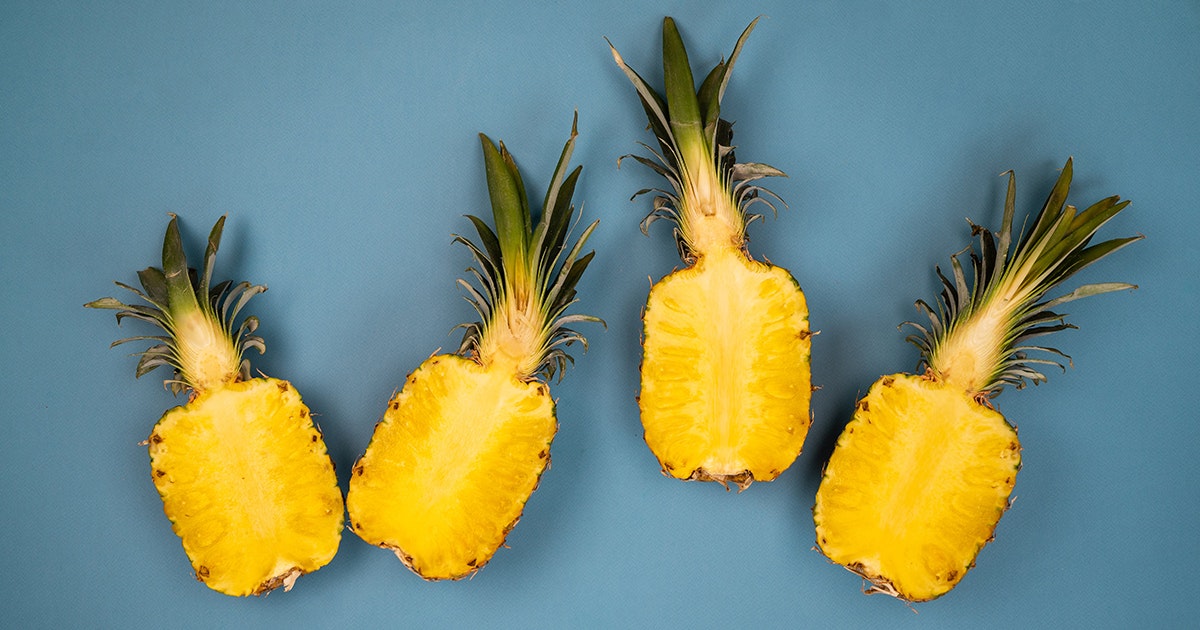Yes, pineapple juice is a good source of vitamin C. The exact amount of vitamin C in pineapple juice depends on whether it is 100% natural, cold-pressed, or pasteurized and fortified with ascorbic acid.
One cup of fresh, juicy pineapple chunks contains 79 milligrams of vitamin C. What we can say with confidence is that one 8-ounce cup of fresh, cold-pressed pineapple juice has more than 88% of your daily vitamin C requirement.
In contrast, pasteurization involves high-heat processing that destroys nutrients, which are then replaced by vitamin C supplements and other additives. Therefore, the vitamin C content indicated on the label of store-bought pineapple juice may be more added ascorbic acid than naturally occurring vitamin C.
Besides vitamin C, fresh pineapple juice's water content is as high as 85%. It also contains vitamins A, B6, E, and K, bromelain, phosphorus, sugar, calcium, fat, protein, organic acids, iron, and niacin. Fresh pineapple juice offers many health benefits. However, in this article, we'll explore all the vitamin C-related health benefits of pineapple juice.
Other Aspects That Affect the Vitamin C Content of Pineapple Juice
Since pineapples ripen from the bottom to the top, the vitamin C content of a pineapple also depends on its ripeness. The vitamin C decreases as the fruit ripens, and the top always contains more vitamin C than the bottom.
Some people remove the center core of the pineapple, which lowers the vitamin C level in the juice. The core contains a significant percentage of the pineapple's vitamin C and other nutrients.
The healthiest way to consume pineapple is by removing only the spiky skin, and cutting it lengthwise into sections, and slow juicing it. This way, you’ll get the goodness from the top, bottom, and core of the pineapple.
Once juiced, you should consume the pineapple juice as soon as possible because it loses vitamin C at an alarming rate. The amount of vitamin C in your fresh pineapple juice today is a lot more than what it will be tomorrow—especially if it was left on the counter.
Health Benefits of Vitamin C in 100% Natural Pineapple Juice
Your body cannot make vitamin C, and therefore, it must come from what you eat and drink. Most Americans love a glass of refreshing pineapple juice on hot summer days. Drinking a glass of pure, cold-pressed pineapple juice per day has many vitamin C-related benefits.
It is important to note that the benefits listed here refer only to natural vitamin C obtained from fresh pineapples and not vitamin C supplements.
1. Immune Support
Vitamin C is well-known as a booster of the immune system. It helps stimulate the production and activity of white blood cells, which are essential for fighting off infections. Consuming pineapple juice with natural vitamin C can contribute to your overall immune health. Although pineapple juice will not prevent colds, vitamin C has been proven in some studies to reduce the length of cold symptoms by about one and a half days.
2. Antioxidant Properties
Vitamin C is a potent antioxidant that helps protect cells from damage caused by free radicals, which are unstable atoms. Antioxidants can reduce the risk of chronic diseases and slow down the aging process. As such, vitamin C in pineapple juice helps protect cells from the damage caused by things like cigarette smoke, pollution, and UV light from the sun.
3. Skin Health
Collagen is a protein that forms the structural framework of your skin and connective tissues. When it comes to overall skin health, collagen maintains skin elasticity and firmness, reducing the appearance of wrinkles. Your body will naturally lose collagen as it ages, which is why it’s important to eat foods that replenish it. Vitamin C is essential for the synthesis of collagen, and consuming pineapple juice with vitamin C will help maintain healthy skin.
4. Wound Healing
The body's wound-healing process also relies on adequate collagen levels. It promotes the growth of new tissue and helps repair damaged skin. Vitamin C aids in the cross-linking of collagen fibers, which strengthens the newly formed tissue and promotes better wound healing. Pineapple juice can provide vitamin C to aid in this process.
5. Anti-Inflammatory
As a powerful antioxidant, vitamin C has anti-inflammatory properties that can help reduce inflammation in the body. This may be beneficial for conditions like arthritis and other inflammatory disorders. The anti-inflammatory power of the vitamin C in pineapple juice may also soothe muscles and aid their recovery after workouts.
6. Eye Health
Vitamin C is a powerful antioxidant that helps protect the eyes from oxidative stress caused by free radicals consuming oxygen and maintaining low levels of oxygen within the eye. This is a viable strategy for minimizing oxidative stress and reducing the risk of cataract formation and age-related macular degeneration (AMD).
7. Cancer Prevention
In cancer, natural vitamin C is associated with prevention, progression, and treatment. People with high intakes of vitamin C from fruits and vegetables might have a lower risk of getting many types of cancer, such as lung, breast, and colon cancer. However, taking vitamin C supplements, with or without other antioxidants, doesn’t seem to protect people from getting cancer.
8. Support Heart Health
The extreme lack of vitamin C may result in various types of cardiovascular disease. However, adequate dietary consumption of vitamin C, such as in pineapple juice, has been found to promote the integrity of endothelium, a necessary component of vascular health and the prevention of hypertension, atherosclerosis, and stroke.
9. Support Brain Health
Pineapple juice is also a perfect drink for supporting brain function. With vitamin C, aging adults can manage brain cell health and enhance their memory as well as other brain functions. Vitamin C neutralizes harmful free radicals, preventing potential damage to brain cells. This protective role is crucial in maintaining brain health and guarding against age-related cognitive decline and neurodegenerative diseases.
10. Enhance Mood
Vitamin C aids in the development of some neurotransmitters that transport information in the brain. One of these is serotonin. Vitamin C is important for the production of serotonin, which acts as a mood stabilizer within our bodies. The link between vitamin C and mood might seem surprising, but people who have vitamin C deficiency often feel fatigued or depressed.
11. Energy Boosting
Vitamin C in pineapple juice can help reduce fatigue and make you feel refreshed again. Our bodies need vitamin C to efficiently convert the food and drinks we consume into energy. It also helps us absorb other vitamins, minerals, and micronutrients to keep our bodies healthy.
12. Enhances Iron Absorption
Vitamin C is crucial for iron metabolism in your body. Iron from plant sources is nonheme iron, which is not easily absorbed by the body. However, you can help your body absorb iron by blending pineapple juice with iron-rich juices. Due to its high vitamin C content, pineapple juice is an excellent drink to boost your iron absorption and increase iron levels in your blood.
Conclusion
While pineapple juice is a good source of vitamin C, it's also relatively high in natural sugars, so it should be consumed in moderation as part of a well-rounded diet. Moreover, keep in mind that the vitamin C content in pineapple juice may degrade over time, so fresh, cold-pressed juice may retain more of its vitamin C content compared to long-shelf-life, commercially processed juices.


Comment